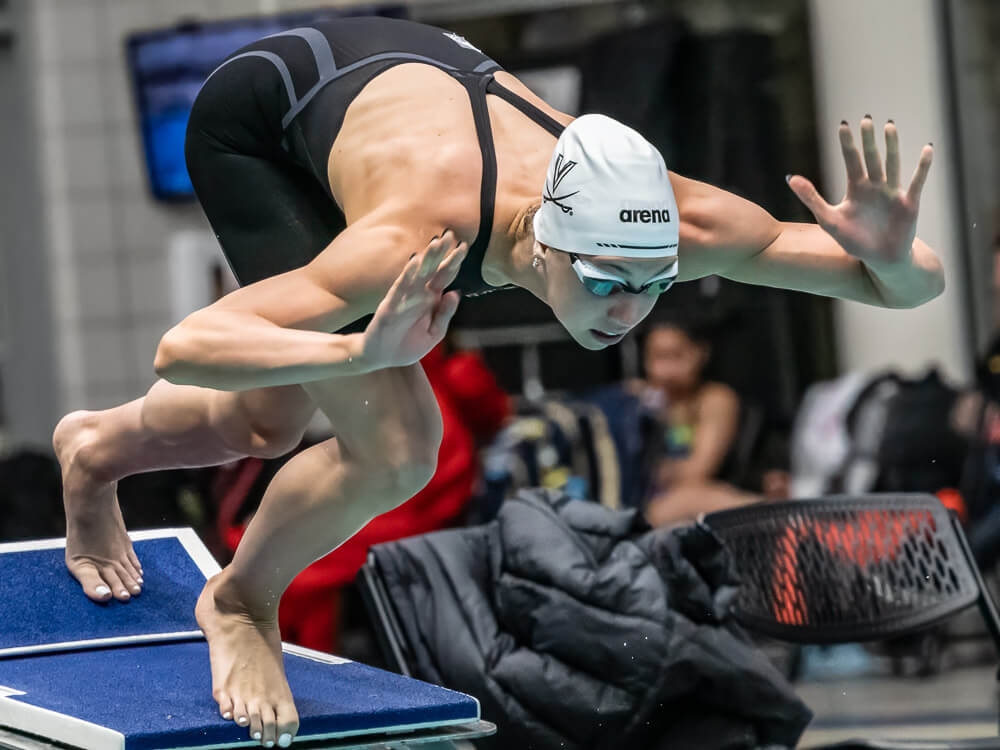Tennessee Invitational: Gretchen Walsh Takes Down American, NCAA Records in 100 Fly

Tennessee Invitational: Gretchen Walsh Takes Down American, NCAA Records in 100 Fly
Less than two years ago, the NCAA Women’s Championships in Knoxville, Tenn., produced by far the fastest final in history in the 100 butterfly. Kate Douglass touched out 100-meter Olympic gold medalist Maggie Mac Neil by five hundredths, with both obliterating the time that had been the fastest ever prior to the race. Torri Huske would finish third in 48.96, making her the third-fastest woman in history at the time.
Since then, Gretchen Walsh has shifted her focus to butterfly and turned the event into her own personal domain. Last season, with Douglass and Mac Neil having moved on to the professional ranks and Huske redshirting, Walsh broke the NCAA and American records on numerous occasions, finally finishing at 47.42 to win the NCAA title. The time allowed her to win by the race by an incredible 2.28 seconds, and she was more than a second quicker than Douglass ever swam.
Eight months later, Walsh has done it again. In her first major college meet since NCAAs, the Tennessee Invitational, Walsh posted a time of 47.35, clipping her previous top mark by seven hundredths. She achieved this latest record swimming in the same building where Douglass and Mac Neil made 48-mid seem incredible not too long ago.
Walsh was out in 21.90, 15-hundredths behind the pace she swam on the way to her 47.42 in March, but her homecoming split was 25.45, with a two-tenth improvement on the last 25 alone.
Notably, Walsh’s University of Virginia teammate Claire Curzan took second in 49.50, her best time as a collegian and ahead of the 49.70 which Emma Sticklen swam to finish second at the 2024 NCAAs. Curzan owns a lifetime-best mark of 49.24, which ranks No. 5 all-time in the event behind Walsh, Douglass, Mac Neil and Huske. Third in the race went to Tennessee’s Josephine Fuller in 51.85.
Shortly before her record-breaking swim, Walsh paced Virginia in the 200 medley relay. She led off in 22.80 before giving way to Aimee Canny, Curzan and Anna Moesch, and the Cavaliers ended up swimming a time of 1:32.58, exactly one second slower than a UVA team also including Walsh swam to win last year’s NCAA title but a half-second ahead of the time second-place Ohio State recorded last March. Tennessee finished second in the race in 1:34.35, with Camille Spink anchoring in 20.91.
Curzan returned later on to post a blistering performance in the 100 backstroke. She clocked 49.37, this time edging her own best time of 49.46 from February 2023. Curzan remains the fifth-fastest swimmer ever in the event, trailing Walsh, Katharine Berkoff, Regan Smith and Beata Nelson. If Walsh skips the 100 back at the NCAA Championships to focus on the 100 fly, as she did last year, Curzan will be the strong title favorite in the event.
Virginia freshman Leah Hayes posted the top time in the 400 IM by almost five seconds. She clocked 4:01.34, surpassed by only three swimmers at last year’s NCAA Championships (Virginia’s Alex Walsh, Florida’s Emma Weyant and Stanford’s Lucy Bell). Tennessee’s Ella Jansen took second in 4:06.29, with the Cavaliers’ Ella Bathurst third (4:09.53).
Canny won the 200 free in 1:42.67, just three tenths slower than she swam in finishing fourth at last year’s NCAA Championships. Moesch clocked 1:43.12, with Spink going 1:43.57. Tennessee swimmers had the two best times in the 100 breaststroke, with McKenzie Siroky winning the event in 58.00 and Emelie Fast touching in 58.41. The Virginia duo of Canny (58.64) and Emma Weber (58.67) also swam strong times.
In diving, Virginia’s Lizzy Kaye won on 3-meter with a score of 317.30, followed by Tennessee’s Lynae Shorter (304.20) and Kentucky’s Devynn Bishop (299.15).



